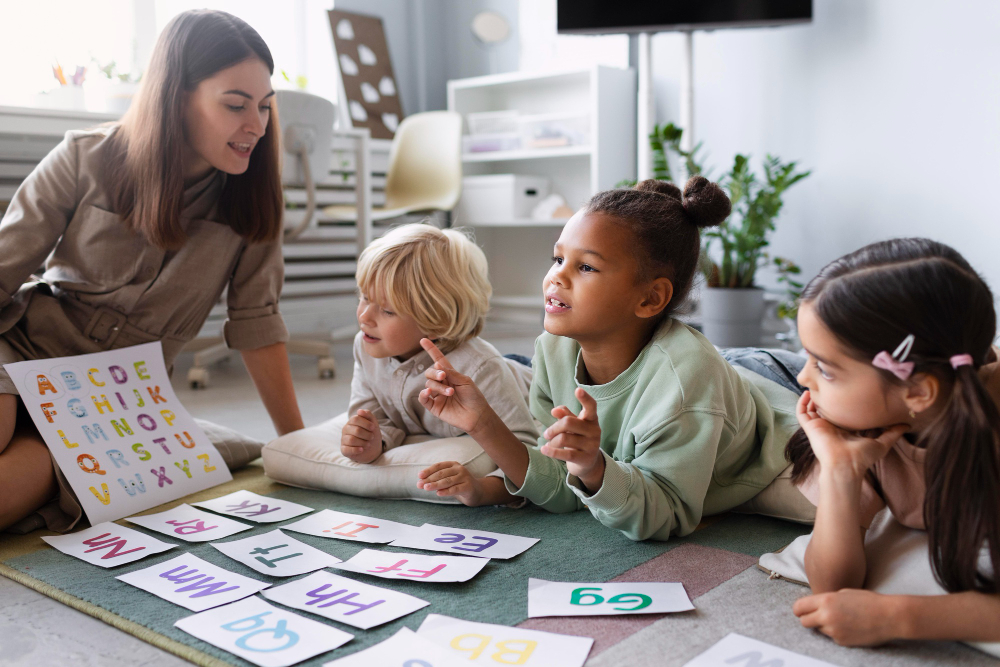The first years of a child’s life are a magical time of discovery and learning. During this critical window, experiences shape brain development and lay the foundation for future success.
Early literacy skills, encompassing the building blocks of reading, writing, and language comprehension, play a vital role in this crucial phase.
This article explores the significance of early literacy and equips parents with practical tips to nurture it in their young children.
Why Early Literacy Matters
Research consistently highlights the profound impact of early literacy on a child’s overall development.
Cognitive Development: Early literacy experiences stimulate brain development in numerous areas. Exposure to language and stories strengthens memory, improves attention span, and fosters critical thinking skills.
As children engage with books and participate in conversations, they learn to analyze information, solve problems, and make connections between ideas.
Language Skills: Early literacy lays the groundwork for strong language development. Children exposed to a rich vocabulary through reading and conversation acquire a broader range of words and a deeper understanding of their meanings.
Literacy experiences also improve grammar comprehension and foster effective communication skills, allowing children to express themselves clearly and confidently.
Academic Success: Strong early literacy skills serve as a springboard for future academic achievement. Children who develop a love of reading and possess a solid foundation in language tend to perform better in school across various subjects.
These early skills contribute to stronger reading fluency, improved writing abilities, and a deeper understanding of complex concepts encountered throughout their academic journey.
Lifelong Learning: Early literacy experiences lay the foundation for a lifelong love of learning. Children who enjoy reading are more likely to become self-directed learners, actively seeking out new information and expanding their knowledge base throughout their lives.
This intrinsic motivation to learn fuels curiosity and exploration, setting the stage for a fulfilling academic and personal journey.
By prioritizing early literacy, you are investing in your child’s future. The benefits extend far beyond academics; they contribute to a child’s overall development, fostering a love of learning, strong communication skills, and a foundation for success in all aspects of life.
Key Components of Early Literacy
Early literacy is the foundation upon which a child’s future reading and writing abilities are built. Understanding its key components is essential for fostering a love of learning and ensuring academic success.
Language Acquisition
- Talk, Talk, Talk: Engage in meaningful conversations with your child. Describe everyday activities, objects, and feelings. Use a rich vocabulary to expand their language skills.
- Read Aloud: Regularly read age-appropriate books to your child. Point out words, discuss their meanings, and explore the illustrations together.
Phonological Awareness
- Rhyming Games: Play rhyming games to enhance phonological awareness. Encourage your child to recognize similar sounds and patterns.
- Letter Sounds: Introduce letter sounds using alphabet books or flashcards. Make it fun by associating sounds with familiar objects (e.g., “B is for ball”).
Comprehension Skills
Interactive Reading: During storytime, ask questions. Discuss characters, plot, and predictions. Encourage critical thinking by asking:
“What do you think this character is feeling?”
“Why do you think the story took that turn?”
“What do you think will happen next?”
Retelling: After reading a book, have your child retell the story in their own words. This reinforces comprehension and memory.
Create a Language-Rich World: Practical Tips for Parents
Now that you understand the significance of early literacy, you might be wondering how to nurture it in your child.
Here are some practical tips for creating a language-rich environment that makes learning fun and engaging:
Fill your home with age-appropriate reading materials. Board books for toddlers, picture books with vibrant illustrations for preschoolers, and chapter books for older children provide a springboard for exploration and independent discovery.
Engage in frequent conversations throughout the day. Narrate your daily routines, describe what you see, and ask open-ended questions. This constant exposure to language helps children learn new words, understand sentence structure, and develop strong communication skills.
Nursery rhymes, songs, and fingerplays are not just fun activities; they play a crucial role in early literacy development. Rhyming and rhythm help children develop phonemic awareness – the ability to hear and distinguish individual sounds within words.
Let your child’s imagination soar! Create stories together, act out scenes from favorite books, or have your child tell you stories about their day or their stuffed animals’ adventures. Storytelling allows children to practice using language creatively and express their thoughts and ideas.
Benefits Beyond Literacy
Beyond reading skills, early literacy offers numerous benefits:
- Curiosity: Children become curious learners.
- Problem-Solving: Exposure to diverse stories enhances critical thinking.
- Empathy: Understanding characters’ emotions fosters empathy.
- Self-Esteem: Success in reading builds confidence.
Make Learning Fun and Engaging
Early literacy experiences should be joyful and stress-free. Show enthusiasm for reading and learning, celebrate your child’s accomplishments, no matter how small, and avoid pressuring them to perform.
Pay attention to what captures your child’s focus and use that as a starting point for learning activities. This personalization makes learning more engaging and meaningful.
Acknowledge your child’s progress, no matter how small. Did they recognize a new letter? Celebrate! Did they sound out a word for the first time? Make a big deal about it! This positive reinforcement motivates them to keep learning and exploring.
Wrapping it up
Children equipped with solid early literacy skills are better prepared for formal education. They enter school with a broader vocabulary, an understanding of basic concepts, and familiarity with books. This readiness positively impacts their academic journey.
Reading together fosters bonding between caregivers and children. It’s a shared experience that promotes emotional connections. Additionally, exposure to diverse characters and situations in books helps children understand emotions, empathy, and social interactions.
Ready to unlock your child’s full potential through early literacy?
Contact Read Smart today at https://readsmartlearning.com/contact-us/ and embark on a journey of lifelong learning and academic success.

